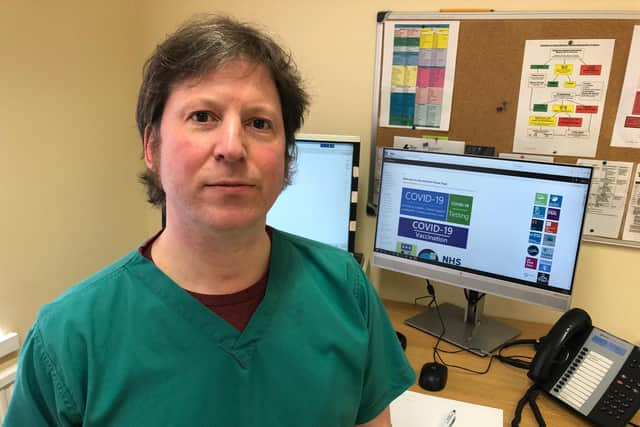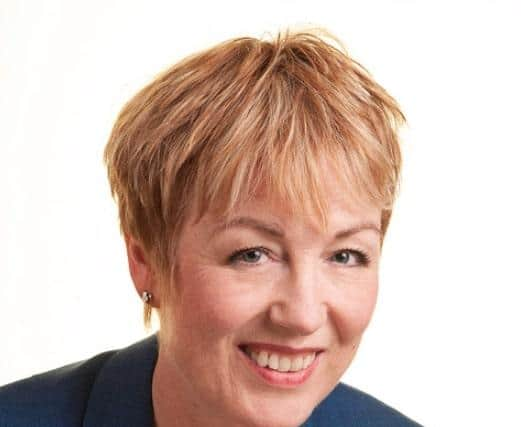Over-stretched Scottish GPs warn of buckling under strain as every day brings new Long Covid cases
Professional body the Royal College of General Practitioners (RCGP) and union BMA Scotland both called for more resources to be directed towards GPs, and for them not to be expected to take charge of the flu and booster Covid vaccination programmes this Autumn.
The Scottish Government is planning for a potential booster Covid vaccine campaign, subject to a decision from the Joint Committee on Vaccination and Immunisation.
Advertisement
Hide AdAdvertisement
Hide AdNational Clinical Director Jason Leitch has said patients may receive both vaccines on the same day, but GPs called for this to be moved away from busy surgeries.


The increase in mild Covid cases has led to more people turning to their GP for support, while those with mental health problems as a result of the pandemic are also on the rise, they said.
On top of this, GP surgeries are seeing Long Covid patients every day, with some practices of fewer than 10,000 patients reporting two to five contacts each day about the condition.
There is an “urgent” need to further support general practice, said Dr Chris Williams, a practising GP and Joint Chair of the RCGP.
“It really can't be underestimated, if general practice falls over, patients are in all sorts of difficulties,” he said.


Dr Patricia Moultrie, Deputy Chair of the Scottish General Practitioner’s Committee of the BMA, said the union is “more concerned than it has been for a long time”.
“General practices are in a very difficult place workload wise, and we are very anxious about what the future weeks and months hold,” she said.
“It does look as though Long Covid is going to be an illness that’s going to be managed in the community, and it’s good that fewer people are being admitted to hospital, but looking at the numbers that we're seeing, we are very concerned about the workload that is going to be sitting in the community with the pandemic.”
Advertisement
Hide AdAdvertisement
Hide AdLimited data shows practices facing workloads even higher than before the pandemic, she said.
NHS Lanarkshire has said GPs are reporting a 30 per cent increase in calls compared to before the pandemic.
Two thirds of GPs said in a recent BMA survey that they are finding their workload unmanageable, and Dr Moultrie warned this may lead to longer wait times and more difficulty accessing services for patients.
“Practices are now under extraordinary stress, they're really exhausted,” she said.
Coping with the workload has been made more difficult by staff needing to self-isolate due to contact with a positive Covid case, and continuing infection prevention measures which limit the number of people who can visit a practice in person at any one time.
The Scottish Government is drawing up plans for a potential campaign of booster Covid vaccines for older and vulnerable people in Autumn, if approved by the JCVI.
Both the BMA and RCGP warned GPs should not be pressured into taking this on.
The vaccine programme has put “huge stress” on practice managers, said Dr Williams, mostly around organising supply.
Advertisement
Hide AdAdvertisement
Hide AdSurgeries were “very proud” to take part in such a vital campaign, and will be glad to do so again where there is a real need, he said, for example with the most vulnerable in society or those in rural areas.
But general practices have been in negotiation with the Scottish Government for some time to move away from vaccination, and he hopes this can continue.
There is “learning to be done” from the first round of vaccination, Dr Williams said, in particular around how other workers or volunteers can take over from general practice.
“There's so much to be done in general practice, and there's no instant supply of new GPs,” he said.
“We’ve got a finite GP workforce, so it’s about trying to take on other other health professionals, and even people who are community link workers, to try and offer new ways of finding people help and assistance and allowing GPs to concentrate on the more difficult, more complex cases.”
Dr Moultrie said there needs to be a “very cautious” approach to GPs’ role in vaccination going forward.
“Delivery of vaccinations is one of the few parts of activity that was traditionally done in general practice that other parts of the system can actually do,” she said.
“We know many GPs will want to contribute to the flu and possibly the Covid vaccination programme, but they’ll have to consider how they can do that along with maintaining patient services in this really difficult situation… We think it would be much more useful to the system more broadly and to patients more broadly, for GP practice and time to be preserved for other activities outwith immunizations.”
Advertisement
Hide AdAdvertisement
Hide AdPatients are becoming “frustrated”, Dr Moultrie said, and in some cases taking this out on practice staff.
Many patients underestimate the pressure on practice staff, said Dr Williams.
“I think people haven't understood all the efforts that are going on in the background, because many of the contacts are by telephone, for example, they don't see how much people are working,” he said.
A Scottish Government spokesperson said: “GP practices will only be asked to provide flu and Covid-19 vaccinations where they have capacity to do so without affecting essential services.”
They added: “Covid-19 is still a relatively new illness and it is important that we continue to improve our understanding of its effects on people. We are keeping all aspects under review, including specialist services and funding to ensure people suffering from long Covid receive the best possible care and support.”
A message from the Editor:
Thank you for reading this article. We're more reliant on your support than ever as the shift in consumer habits brought about by coronavirus impacts our advertisers.
If you haven't already, please consider supporting our trusted, fact-checked journalism by taking out a digital subscription.
Comments
Want to join the conversation? Please or to comment on this article.